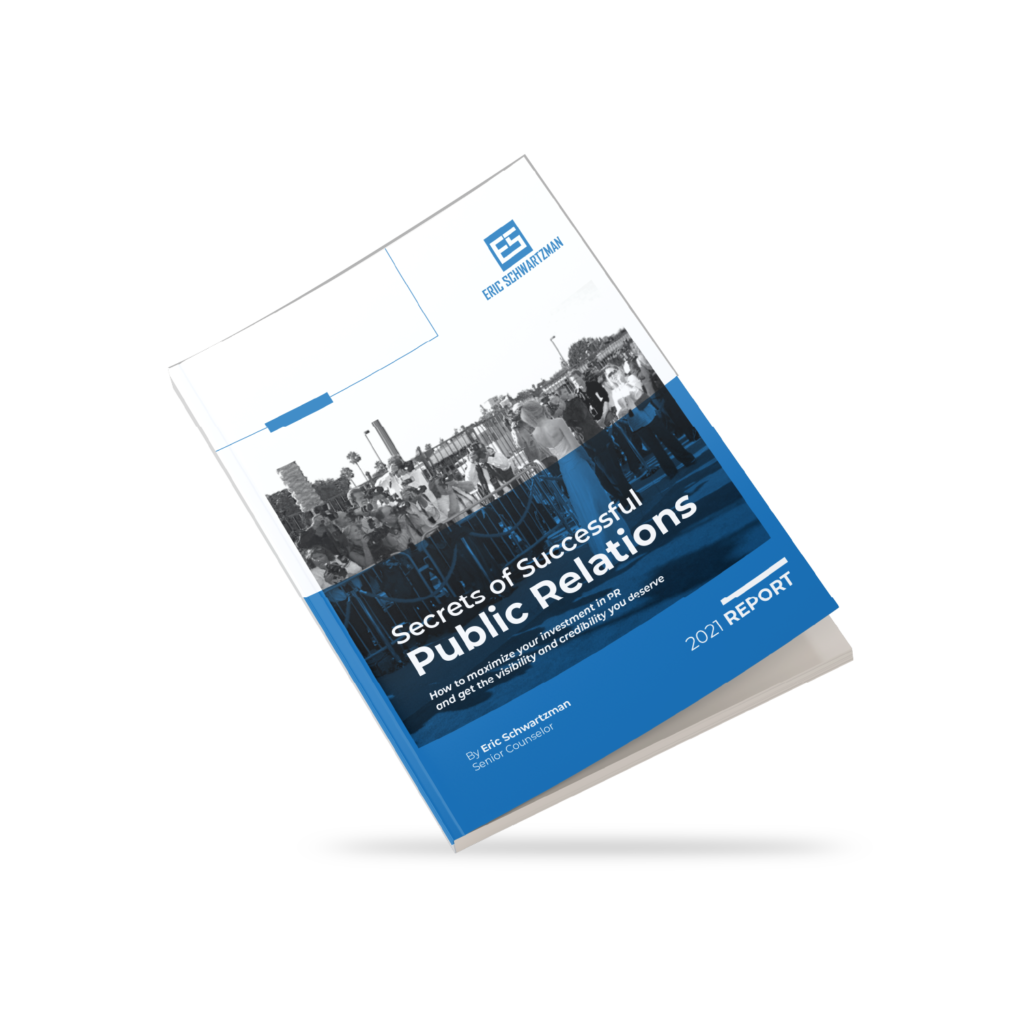Public Relations Agency Buyer's Guide

SPECIAL REPORT
How to Select the Right Public Relations Agency
- What is a Public Relations Agency?
- What does a Public Relations Agency do?
- How to interview a Public Relations Agency
- How to manage a Public Relations Agency
- How to get press coverage for your startup
Public Relations Agency Secrets...
Secrets of Successful Public Relations Agency Campaigns
I managed campaigns at one of the largest public relations agencies in the world. I also had my own public relations agency and represented some of the biggest brands in the world.
If you're considering hiring a public relations agency, read this first.
This is a no-fluff, strategic guide to avoid the costly errors first-timers make when they hire a public relations agency or freelancer.
Public Relations Agency Buyer's Guide
*** DOWNLOAD ***
Landing Page - Secrets of PR
Public Relations Agency Buyer's Guide Overview
Absolutely! Here's a re-write incorporating those phrases, while still focusing on the core purpose of the buyer's guide:
Ready to elevate your brand and reach your target audience? While a marketing agency may be what first comes to mind, a strategic communications agency specializing in public relations can be a game-changer. This Public Relations Agency Buyer's Guide will help you:
- Understand the power of strategic communications: Discover how public relations builds credibility and trust through earned media and thoughtful messaging.
- Decide if a communications agency is right for you: Learn when partnering with a public relations firm aligns best with your goals.
- Find the perfect agency fit: We'll guide you through the selection process, from identifying your needs to evaluating agencies.
- Get the most from your investment: Get insider tips for a successful partnership and maximizing your public relations strategy's impact.
Download our guide today and unlock the potential of public relations for your business!
About the Author
With years of experience leading innovative public relations campaigns, Eric Schwartzman has garnered a deep understanding of the industry's nuances, from crafting compelling narratives to managing crisis communications effectively.
His tenure as a public relations agency leader has provided him with firsthand insights into what businesses need when seeking a public relations agency, making him adept at advising on the selection process, negotiation of contracts, and building successful agency-client relationships.
Eric Schwartzman's role as an public relations agency educator and author of best-selling books on strategic communications, public relations, social media marketing underscores his ability to distill complex concepts into actionable advice, making him the ideal candidate to guide businesses through the intricacies of hiring a public relations agency.
Public Relations Agency Buyer's Guide FAQ
Understanding Public Relations Agencies
Public relations agencies are specialized firms dedicated to crafting and maintaining a company's image through effective media relations, compelling storytelling, crisis management, and strategic communications.
The Advantages of Hiring a Public Relations Agency
Hiring a public relations agency brings the expertise needed to create impactful messages that resonate with both the media and the public. These agencies have established networks of journalists and influencers, enabling them to significantly amplify your brand's reach and enhance its public perception.
Exploring Different Types of Public Relations Agencies
- Consumer Public Relations: Focuses on product launches and building brand awareness.
- Corporate Public Relations: Specializes in reputation management and investor relations.
- Technology Public Relations: Aims at securing media coverage for startups and tech companies.
- Healthcare Public Relations: Caters to medical and pharmaceutical clients with specialized needs.
- Crisis Communications Public Relations: Expertise in managing negative publicity and safeguarding reputations.
Defining Your Needs
Identify your primary goals, such as increasing brand visibility, launching a new product, or navigating a crisis. Consider your target audience, the size of your business and growth objectives, required industry expertise, and budget to guide your search.
Researching Public Relations Agencies
Start with referrals from colleagues or industry contacts, consult online directories like the Public Relations Association of America or the International Association of Business Communicators and check out public relations agencies that have been recognized by industry awards like the PRWeek Awards or PRSA Awards.
Evaluating Potential Agencies
Review case studies and success metrics to gauge each public relations agency's ability to meet your specific goals. Assess the agency's experience with similar clients or industries and ensure their team and cultural values align with your company's.
The Request for Proposal (RFP) process is a critical step in selecting the right public relations agency for your business. It allows you to communicate your needs and expectations clearly, ensuring that potential agencies can accurately assess whether they can meet your objectives. Here’s how to navigate the RFP process effectively:
When to Issue an RFP to Public Relations Agencies
Consider issuing an RFP when your project is large-scale, complex, or when you want to compare capabilities, strategies, and value propositions from multiple public relations agencies. This process is particularly beneficial if you're exploring services in specialized areas such as crisis communication, healthcare, or technology public relations.
Crafting an Effective RFP for Public Relations Agencies
An effective RFP for a public relations agency should include:
-
Company Background: Provide a comprehensive overview of your company, including its mission, values, and key objectives. This context helps agencies understand your brand and tailor their proposals to fit your unique needs.
-
Public Relations Project Scope and Objectives: Clearly define what you aim to achieve with the public relations campaign. Whether it’s enhancing brand visibility, managing a crisis, or launching a new product, detailed objectives guide agencies in proposing relevant strategies.
-
Target Audience for Your Public Relations Campaign: Describe your target demographic and any insights into their behaviors or preferences. A well-defined audience allows agencies to tailor their approach to the channels and messages that will resonate most.
-
Public Relations Industry Expertise: Specify if you require expertise in a particular sector. Agencies with a strong background in your industry can leverage their experience and contacts more effectively.
-
Public Relations Budget: Disclose your budget range. Transparency about your budget helps agencies propose realistic and achievable plans.
-
Public Relations Campaign Timeline: Include key milestones and deadlines. A clear timeline ensures that the agency’s plan aligns with your schedule.
-
Public Relations Agency Evaluation Criteria: Outline how you will assess proposals. Criteria might include creativity, strategic approach, industry experience, cost, or previous success metrics.
C. Tips for a Successful RFP for Public Relations Agencies
- Be Specific Yet Open: While it’s important to be clear about your needs, leave room for creative solutions. Agencies can often suggest innovative approaches you might not have considered.
- Engage in Dialogue with Public Relations Account Executives: Encourage agencies to ask questions. Their inquiries can provide insights into their engagement level and understanding of your project.
- Provide Context: The more information you share about your challenges and goals, the more tailored and effective the proposals will be.
- Respect Timeframes: Set realistic deadlines for submission and review. Allow enough time for agencies to prepare thorough proposals and for your team to evaluate them carefully.
The RFP process is your opportunity to find a public relations agency that not only understands your business and its challenges but is also capable of becoming a strategic partner in achieving your communication goals. By following these guidelines, you can streamline the selection process and increase your chances of finding the right public relations agency for your business.
Once you've selected a public relations agency that aligns with your business needs, the next step is to negotiate a contract and fee structure that benefits both parties. Here's how to approach this crucial phase:
Public Relations Agency Fee Structures
Public relations agencies typically offer several fee structures:
- Hourly Rates: Best suited for projects where the scope is undefined or expected to change. Ensure you understand the tasks included and the hourly rate for each.
- Retainers: A fixed monthly fee covering a set of agreed-upon services. This is ideal for long-term relationships requiring ongoing work. Clarify what's included in the retainer and the process for handling out-of-scope work.
- Project-Based Fees: A one-time fee for a specific project with defined deliverables. This option provides clarity on costs upfront but requires a clear understanding of the project scope.
Negotiating Terms with a Public Relations Agency
- Scope of Work: Clearly define the deliverables, including what constitutes a revision or out-of-scope request. Ambiguities here can lead to disputes.
- Timeline: Agree on a realistic timeline, including milestones and deadlines. Consider including penalties for missed deadlines if the project is time-sensitive.
- Payment Structure: Discuss payment terms, including any upfront payments, milestone payments, and final payment upon completion. Ensure these terms are manageable for your cash flow.
- Intellectual Property: Clarify the ownership of work produced during the engagement, especially if the work includes creative content.
Red Flags in Public Relations Agency Contracts
- Vague Descriptions: Ensure every service and deliverable in the public relations agency is clearly described to avoid future misunderstandings.
- Unreasonable Termination Clauses: Look for fair terms that allow the public relations agency and client to terminate the contract under reasonable conditions.
- One-sided Payment Terms: Although advance notice of termination is usually required, be wary of terms that place undue financial strain on your business, such as large upfront payments or harsh late payment penalties.
A fruitful relationship with your public relations agency is built on clear communication, mutual respect, and shared goals. Here are tips to ensure a successful partnership:
Establish Clear Communication Channels with your Public Relations Agency
- Regular Client / PR Agency Check-ins: Schedule weekly or bi-weekly meetings to discuss progress, upcoming initiatives, and any adjustments needed.
- Open Feedback Loop: Encourage honest and constructive feedback from both sides. Addressing issues early can prevent them from escalating.
Setting Realistic Expectations from a Public Relations Agency
- Educate Your Team: Ensure your team understands the nature of public relations work and the timeframes involved. Immediate results are rare; long-term strategies build lasting value.
- Define Successful Public Relations Outcomes: Agree on what success looks like for your campaigns. Whether it's increased media coverage, enhanced brand reputation, or specific business outcomes, having clear KPIs helps measure effectiveness.
Measuring Public Relations Agency Results
- Public Relations Reporting: Request regular reports detailing the agency's activities, media placements, and the impact on your business goals.
- Public Relations Strategy: Be open to adjusting strategies based on results. The public relations landscape is dynamic, and flexibility can lead to better outcomes.
Foster a Client / PR Agency Partnership Mentality
- Trust Their Expertise: You're hiring experts for their knowledge and skills. While it's important to be involved, trusting their recommendations can lead to more innovative and effective strategies.
- Collaborate on Solutions: View challenges as opportunities to collaborate and strengthen your relationship. Working together on solutions can lead to more creative and effective outcomes.
Building a successful partnership with a public relations agency involves clear contracts, open communication, and shared goals. By following these guidelines, you can ensure a productive relationship that drives your business forward.
Public Relations Agency Buyer's Guide Excerpts



Get Eric Schwartzman's book on B2B digital marketing









